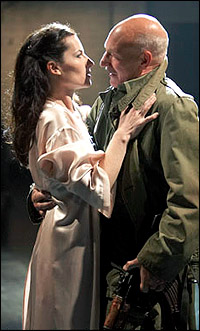
*
"Before I leave my dressing room to go onstage every evening, the last thing I do is to put on my military cap. And when I look in the mirror, my father is looking back at me," says Patrick Stewart, the greatest Macbeth of my lifetime and the son of a regimental sergeant major in the British army.
It is often forgotten that soldiering is how Macbeth comes to the attention of King Duncan. His military exploits have been so outstanding that Duncan elevates him to thane of Cawdor, a position from which he, or at least his wife, can imagine the possibility of the throne for himself — if, that is, he can get rid of the king and his two sons. In no time, with the assistance of an insanely ambitious wife and three meddling witches, the soldier becomes a general, then an aristocrat, then a murderer, then king.
How he does it is at the heart of director Rupert Goold's Stalinist conception of Macbeth, now gracing Broadway's Lyceum Theatre following sold-out runs in England at Chichester and in the West End and another sell-out at the Brooklyn Academy of Music (BAM). Blood drenches this production; even the water coming out of the taps is blood-red — Macbeth's hands and arms are bathed in it after the murder of Duncan.
"It's written into the play," says Stewart, as though I should know this. I say nothing. "Well," he allows, after an excellent pause, "it's just a matter of degree." Stewart is a thoughtful man and a thoughtful actor. He is very good at pauses. Talking with him is an exercise in waiting. He thinks through every answer, and when he speaks, it is in complete sentences. He gives little away — and why should he? He is giving the finest Shakespearean performance New York has seen in many years, and that speaks for him.
 |
||
| Kate Fleetwood and Patrick Stewart in Macbeth. |
||
| photo by Manuel Harlan |
What changed everything, of course, was his surprise casting as Captain Jean-Luc Picard in "Star Trek: The Next Generation." Not only did his seven years on the iconic television series make him a household name in the United States, it made possible the kind of leading roles he has subsequently played: Prospero in The Tempest; Antony in Antony and Cleopatra; his brilliant one-man turn in Dickens' A Christmas Carol, which became a worldwide hit onstage and on television; and a dizzying number of other roles in which he has succeeded greatly but which would not, perhaps, have come his way before he sat in that chair and uttered his catchphrase, "Make it so."
I wondered aloud about how his Macbeth makes the transition from loyal servant of the Crown to evil tyrant, and whether this good soldier but weak man would even have considered going for the king had he not been married to an ambitious woman for whom the thane of Cawdor wasn't nearly enough. What is the impetus for evil? Would Clyde have been just a small-time thief if he hadn't met Bonnie? Would Myra Hindley and Ian Brady, the mass-murderers of children, have been simply two lonely, dysfunctional individuals if they hadn't met and discovered a mutual sexual obsession, each fed by the other? "We talked about this," says Stewart. "In fact, on my dressing room wall, in every theatre we've played this Macbeth, is a quotation from Myra Hindley. It says, 'Evil can be a spiritual experience, too.' It's that 'too' that's most frightening."
Having played this production in England before coming to New York has engendered in Stewart some fascinating insights about the differences. "Here, audiences laugh more. They find every possible comic moment in Macbeth, which you wouldn't have thought has a great many, and laugh out loud. When we opened at BAM, Rupert, who wasn't with us, was worried that the play was running four minutes longer than it had in the West End. When he got here he realized that we weren't milking it; it was the audience reaction that was taking the extra time. These audiences are intelligent, they understand the issues in the play immediately. They react, not just by laughing, but by experiencing it with us. And they are so generous."










